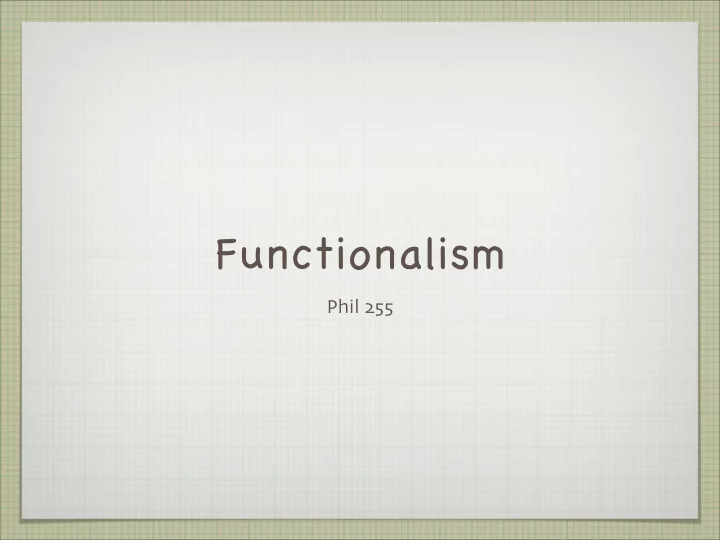

Functionalism Phil 255
Functionalism after James Angell and Dewey are largely credited with continuing James ’ vision However , Angell ’ s textbook , ‘ Psychology ,’ came out in 1909, when behaviourism was on the rise Focus was on: conscious / unconscious division; cognitive development , and a scienti fi c approach Contemporay cognitive psychology shares these commitments , but expands on them with increased rigor in discussing ‘ function ’ because ...
The rise of the computer
Rise of the computer 19 th c . Babbage ’ s analytical engine ( never built ) CPU , APU , RAM , output 1945 ENIAC fi rst fully electronic computer 1945 Von Neumann introduced current computer architecture ( stores program in same form as data ) Recent advance challenge our notion of intelligence ( e . g . Deep Thought and Deep Blue ) Most important theoretical development: Turing Machine
Turing Machines Alan Turing (1036) invented this theoretical entity Showed it could compute all computable function TMs consist of: 1) tape of ones and zeros; 2) read / write head; 3) table of instructions re: what to do given value on tape
An adder State Input Output Next State 0 R1 2 1 1 R1 1 0 L0 3 2 1 R1 2 0 L0 3 3 1 L0 4 0 R0 Halt 4 1 L1 4 [1 0 1] => 1 1 [1 1 0 1 1 1] => 1 1 1 1 1
Consequences Very simple , but shares essential properties with all computers Divorces computation from implementation De fi nes the function of a device If human thought is determined by functions , and TMs describe functions in the abstract ... Turing suggested the Turing test for intelligence Imitation game ( computer tries to fool a judge into thinking it ’ s human ) If successful , Turing says , machine should be considered intelligent
Computer as mind Mental Data Structures Representations ⇔ Algorithms Computations Program Execution Thinking Computer Mind Further analogies: hardware? program? programmer? Disanalogies?
Solves mind/brain problem How can minds and brains be the ‘ same ’ ? Property dualism Materialist Putnam was one of the fi rst to argue for ‘ TM functionalism ’ Functional isomorphism determines ‘ mentality ’ Autonomy from physics No ontological dualism TMs / FI is abstract hence independent of implementation
Consequences Identity theory must be false Multiple realizability thesis must be true Dualists and materialists are both wrong assuming explanation follows ontology e . g . square peg More general explanations are more useful TM functionalism must be modi fi ed states of humans are experience dependent mental states can be multitudinous
Extending functionalism Functionalism was well - received because it Was theoretically well - founded Solved ( at least ) four main problems with past approaches Functionalism was associated with other theses to provide a more complete psychological theory ( Fodor ) Language of Thought hypothesis CTM This approach is ( very ) consistent with folk - psychology
Problems with functionalism Largely identi fi ed through the use of thought experiments A number of important disanalogies to real experiments However , they do have their advantages as well Must be used with caution & self - consciously The ‘ Great Mind of China ’ Lots of people ( pigeons , fl eas ) talking on radios with appropriate functional isomorphism Intended as a reductio ad absurdum Begs the question , no alternative
Searle Chinese room
English Room
Consequences Intended to be a reductio ad absurdum as well Aimed at ‘ strong AI ’ as opposed to ‘ weak AI ’ It satis fi es all the tenets of CTM , but fails to be intentional Functionalism is false CTM is false Obvious by analogy to simulations of fi re and weather Disanalogies?
Responses No understanding Systems reply + No Understanding rejoinder: Internalize the rules No Understanding Robot reply rejoinder: 1) broke the rules; 2) still doesn ’ t work Brain simulator reply rejoinder: 1) gave up functionalism; 2) still doesn ’ t work Combination reply rejoinder: 1) might fool people; 2) still no understanding Learning reply
Discussion Searle thinks machine ’ s can have understanding But formal descriptions are the wrong way to fi nd them need the right causal properties Is this an alternative to strong AI? Do they not suggest causal properties? What are the right causal properties? ( Or how can we discover them? ) Why do somethings with those causal properties not count as understanding? ( Or do they? )
Functionalism & Consciousness Absent qualia Entrance of zombies into philosophy Machine table of zombie is the same , but experience isn ’ t Begging the question? Inverted spectra Qualia and function are separable Begging the question?
Blindsight Usually from signi fi cant damage to primary visual cortex Not always: http: // serendip . brynmawr . edu / bb / blindsight . html Taken ( e . g ., by Lyons ) to show independence of function and qualia Is the function the same? Does this establish the independence of qualia and function? What does it show? Completely di ff erent: Animals , qualia , and zombies ... ?
Recommend
More recommend